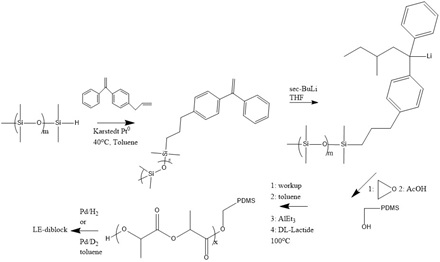SYNTHESIS OF DEUTERIUM LABELLED MODEL POLYMERS FOR THE STUDY OF POLYMER DEGRADATION
On the path to the development of a quantitative analytical method to assess the degradation of microplastic particles (MPs) some model deuterium labelled polymer analogues are needed. The present MSc project is aimed at synthesizing these model compounds.
We hypothesize that MPs are essentially degradable but that the degradation process of common MPs is slow under environmentally realistic conditions, causing a built-up of MPs in the environment. The understanding of the degradation process is rudimentary from both a materials and a biological perspective. In this project designed and labelled MPs to help fill this knowledge gap is produced. The synthesis for of end-functionalized linear low density polyethylene proceeds through polymerization of butadiene followed by catalytic hydrogenation with either hydrogen or deuterium. The obtained samples will at a later stage (not necessarily in the project) be subject to degradation in model environment. The degradation will be quantified by measurement of DHO in the environment, as reported either using cavity ring-down spectroscopy or FTIR-spectroscopy, which both can detect deviation from natural deuterium abundance at the 0.001% level or by gas phase FTIR spectroscopy. Data for gas phase IR DHO spectra indicates that gas phase spectroscopy can improve the sensitivity by an order of magnitude.
Requirements: MSc student ready for starting the thesis within the next ½ year
POLYMER-POLYMER INTERACTIONS PARAMETERS THROUGH BLOCK COPOLYMER SYNTHESIS AND TODT-MW CORRELATIONS
The purpose of the project is to synthesize diblock-copolymers poly(ethylene-alt-propylene)-block-poly(methylmethacrylate), poly(styrene)-block-poly(ethylene-alt-propylene), and poly(lactate)-block-poly(dimethylsiloxane) at molecular masses where the order-to-disorder transition temperature TODT is accessible and measure the TODT's for at least two samples for each polymer. The purpose is to measure the pairwise Flory-Huggins interaction parameter.

Requirements: MSc student ready for starting the thesis within the next ½ year
SUSTAINABLE SOAP BUBBLES FOR ENTERTAINMENT
Since 1991, Experimentarium has disseminated science at eye level for both children, young people, and adults. As part of its sustainability strategy, Experimentarium seeks to optimize existing products, including our soap bubble solution.
Soap bubbles are Experimentarium's trademark. Therefore, it is incredibly important that our soap bubble solution be of high quality so that it is easy to use by our guests who do not necessarily possess great soap bubble making abilities. In addition, the soap bubble solution is used in soap bubble shows, where its capabilities are challenged even further by Experimentarium's exhibition pilots who possess expert knowledge in soap bubble making.
In practical terms, the soap bubbles must meet many criteria. The soap bubble solution must be durable for several days and its soap bubbles must, among other things be elastic and resistant to handling, so that it can be used to make small bubbles, large bubbles, and all kinds of soap bubble tricks.
The soap bubble solution used by Experimentarium already meets the above-mentioned criteria. However, it has been decided that it must now be ensured to be environmentally and allergy friendly.
In order to develop a new and improved soap bubble solution recipe, Experimentarium wishes to study soap bubbles. The goal is to understand the physics and chemistry of the soap bubble formation as well as describe the role of the individual components in the recipe with respect to the role in the bilayer formation and stability and with respect to environmental impact and potential allergenic properties.
Requirements: MSc student ready for starting the thesis within the next ½ year